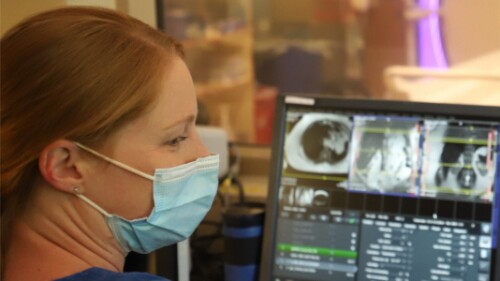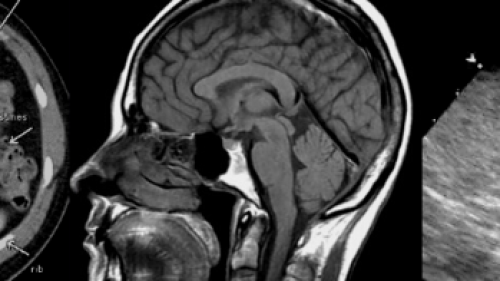
Computed Tomography
The Undergraduate Certificate in Computed Tomography at Kent State University is an online program that provides healthcare professionals with advanced knowledge in CT imaging. This program is ideal for radiologic technologists looking to enhance their skills and specialize in computed tomography, offering flexible coursework to support career advancement.
Computed Tomography Undergraduate Certificate Program Overview
The Computed Tomography undergraduate certificate provides coursework in anatomy, patient management, procedures and image production. Students observe computed tomography procedures, perform procedures under direct supervision of registered technologists and complete required clinical competencies toward the national certification exam for computed tomography or to be applied toward continuing education requirements as deemed by the American Registry of Radiologic Technologists (ARRT)
Computed tomography (CT) scans are ordered on trauma, cancer and non-trauma patients and is often the first diagnostic imaging exam ordered on patients. A computed tomography technologist works in hospitals or outpatient healthcare facilities using a CT scanner with an x-ray unit that rotates to image anatomy in the body as slices. The images are assembled and reconstructed digitally to create a series of diagnostic images that physicians use to interpret for a patient diagnosis.
The Computed Tomography certificate offers a seamless transfer pathway into the Bachelor of Radiologic Imaging Sciences Technology (B.R.I.T.) degree. Students are able to complete the certificate, sit for the national certification exam, begin working in the profession and then enroll in the B.R.I.T. degree and complete the remaining requirements to earn the bachelor’s degree.
Program Learning Outcomes
Graduates of this program will be able to:
- Apply knowledge to the practice of computed tomography.
- Effectively utilize critical thinking, problem-solving and decision-making skills in the practice of computed tomography.
- Effectively communicate in oral and written form with patients, customers and all members of the health care team.
- Successfully perform computed tomography procedures and attain results of high diagnostic value, while providing patient care.
- Exhibit personal and professional attributes and values relevant to the practice of computed tomography.
Professional Licensure Disclosure
This program is designed to prepare students to sit for applicable licensure or certification in Ohio. If you plan to pursue licensure or certification in a state other than Ohio, please review state educational requirements for licensure or certification and contact information for state licensing boards at Kent State’s website for professional licensure disclosure.
Computed Tomography Undergraduate Certificate Program Admissions Requirements
Admission to this program is selective. Applicants must have graduated from a program in radiologic technology, diagnostic medical sonography, nuclear medicine or radiation therapy and be a registered or registry-eligible radiologic technologist, diagnostic medical sonographer, nuclear medicine technologist or a radiation therapist. Applicants must have a minimum 2.50 overall GPA prior to program entry.
The program begins in fall with an application deadline of July 1 each year.
Program Courses
Program Requirements
| Code | Title | Credit Hours |
|---|---|---|
| Certificate Requirements 1 | ||
| RIS 34084 | COMPUTED TOMOGRAPHY AND MAGNETIC RESONANCE IMAGING SECTIONAL ANATOMY I (min C grade) | 2 |
| RIS 34086 | COMPUTED TOMOGRAPHY AND MAGNETIC RESONANCE IMAGING SECTIONAL ANATOMY II (min C grade) | 2 |
| RIS 44021 | PATIENT MANAGEMENT IN COMPUTED TOMOGRAPHY (min C grade) | 2 |
| RIS 44030 | COMPUTED TOMOGRAPHY IMAGE PRODUCTION I (min C grade) | 2 |
| RIS 44047 | COMPUTED TOMOGRAPHY PROCEDURES I (min C grade) | 2 |
| RIS 44048 | COMPUTED TOMOGRAPHY PROCEDURES II (min C grade) | 2 |
| RIS 44062 | COMPUTED TOMOGRAPHY IMAGE PRODUCTION II (min C grade) | 2 |
| Clinical Electives, choose from the following: | 4 | |
| RIS 44004 | COMPUTED TOMOGRAPHY CLINICAL EDUCATION I | |
| RIS 44054 | COMPUTED TOMOGRAPHY CLINICAL EDUCATION II | |
| RIS 44092 | COMPUTED TOMOGRAPHY/MAGNETIC RESONANCE INTERNSHIP (ELR) | |
| Minimum Total Credit Hours: | 18 | |
1Students are encouraged to register for the following courses during the summer term: RIS 44068 is a review course for the national certification exam. RIS 44069 allows students to gain added experience in MRI and to complete required clinical competencies for the ARRT exam. These courses not required to graduate with the certificate.
Computed Tomography Undergraduate Certificate Program Tuition and Fees
Ohio Residents
| Per Credit Hour | Per 2-Credit Course | Approximate Tuition Cost |
$405.15 Upper Division Courses | $810.30 | $7,200 part-time1 $4,400 full-time 2 |
Non-Ohio Residents
| Per Credit Hour | Per 2-Credit Course | Approximate Tuition Cost |
$415.15 Upper Division Courses | $830.30 | $7,400 part-time3 $4,600 full-time4 |
1The $405.15 per-credit-hour tuition rate for UPPER division courses applies to part-time Ohio resident undergraduate students taking fewer than 12 credit hours per semester. This certificate consists of all upper division courses.
2The flat-rate semester fee of $4,457.36 for UPPER division courses applies to full-time Ohio resident undergraduate students taking between 12-18 credit hours per semester. This certificate consists of all upper division courses. This full-time cost is based on a student completing the certificate in one semester.
3The $415.15 per-credit-hour tuition rate for UPPER division courses applies to part-time non-Ohio resident undergraduate students enrolled in a fully online degree program and taking fewer than 12 credit hours per semester, PLUS a $10 per-credit-hour surcharge. This certificate consists of all upper division courses.
4The flat-rate semester fee of $4,457.36 for UPPER division courses applies to full-time non-Ohio resident undergraduate students enrolled in a fully online degree program and taking between 12-18 credit hours per semester, PLUS a $10 per credit hour surcharge for actual credits taken (between 12-18 semester credits or $120-$180). This certificate consists of all upper division courses. This full-time cost is based on a student completing the certificate in one semester.
- An additional Distance Learning fee for all students enrolled in a distance learning course is $15 per credit hour. Program tuition and costs are estimated and subject to change.
- Actual tuition costs will vary based on a student’s chosen academic plan. The full cost of attendance consists of tuition and fees, and when applicable, food, housing, books, course materials, supplies and equipment, transportation and personal expenses for the enrolled terms. Other expenses not included in tuition and fees totals can be found on the Kent State University cost of attendance web page.
- For a complete listing of tuition rates for approved online programs, please contact Kent State’s Financial, Billing & Enrollment Center at 330-672-6000 or via our website Contact Us link.





